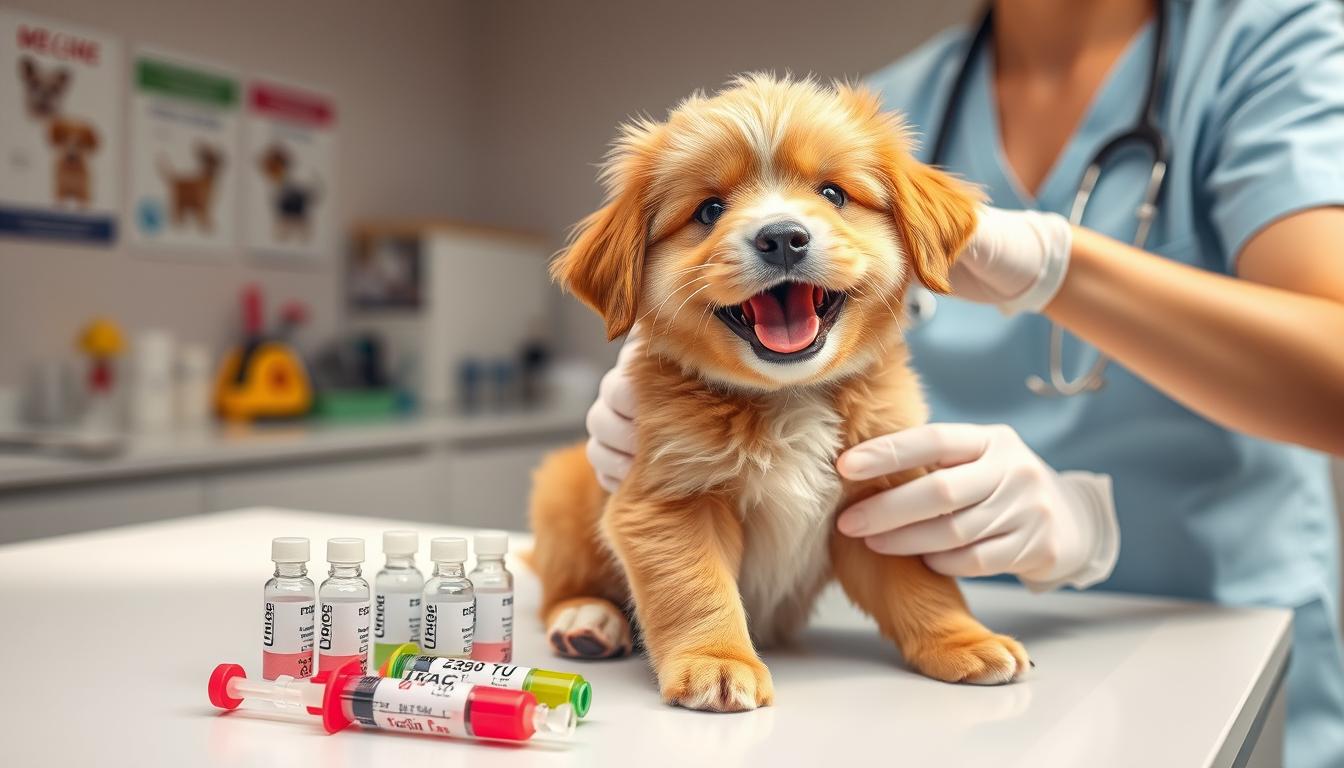Ever thought about how important puppy vaccinations are? As a caring pet owner, keeping your furry friend healthy is key. But what are these essential puppy vaccination tips, and how do they protect your pup? Let’s explore the answers together.
Key Takeaways
- Vaccinations are crucial to protect puppies from contagious and potentially fatal diseases.
- Puppies can be exposed to many common but preventable diseases in their environment.
- Building your puppy’s immunity through a complete vaccination program is essential.
- The average cost of puppy vaccinations in Australia ranges from $180 to $250 for the first three shots.
- Timely catch-up vaccinations are crucial if a vaccination appointment is missed.
Why Vaccinate Your Puppy?
Vaccines are key to keeping your puppy safe from many diseases. They help your puppy stay healthy and happy for a long time. Vaccines teach your puppy’s body how to fight off diseases, so it can stay safe in the future.
Protecting Your Furry Friend from Preventable Diseases
Puppy vaccines protect your pet from serious diseases. These include distemper, hepatitis, and parvovirus, which can be deadly. Keeping your puppy’s vaccinations current helps prevent these diseases and keeps them healthy.
Building Immunity Against Life-Threatening Illnesses
Vaccines are vital for building your puppy’s defense against serious diseases. After getting vaccinated, your puppy’s body learns to fight off diseases like parvo and distemper. This is important for your puppy’s health and long life.
“Keeping your puppy’s vaccinations up-to-date is crucial for a healthy lifestyle and proper pet development.”
Core Puppy Vaccinations
Keeping your puppy safe from deadly diseases is key. The C3 vaccine is a must for all dogs, no matter their age or breed. It protects against three major diseases: canine distemper virus, canine hepatitis, and canine parvovirus.
Canine Distemper Virus
Canine distemper is a deadly virus that can harm a dog’s breathing, stomach, and brain. The C3 vaccine helps fight this disease. Symptoms include fever, cough, vomiting, and brain problems.
Canine Hepatitis
Canine hepatitis can damage a dog’s liver and cause bleeding and eye issues. The C3 vaccine keeps your dog safe from this disease. It’s especially important for young dogs.
Canine Parvovirus
Canine parvovirus is a contagious and deadly virus that affects a dog’s stomach. Puppies are most at risk. It can cause severe vomiting, diarrhoea, and dehydration. The C3 vaccine is vital for protection.
The C3 vaccine is essential for keeping your puppy safe from these dangerous diseases. Making sure your puppy gets these shots on time is crucial for their health.
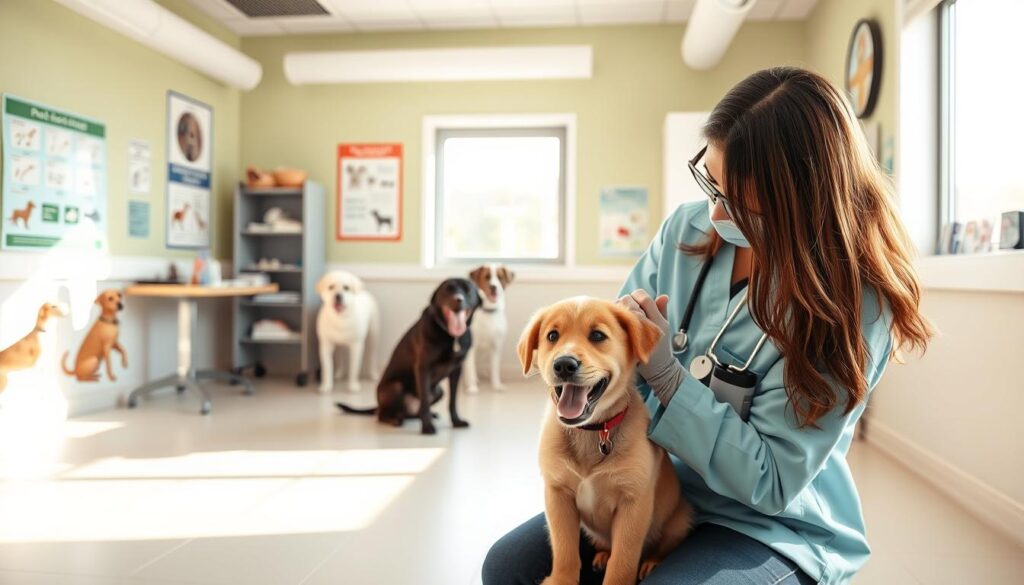
Non-Core Puppy Vaccinations
Core puppy vaccinations are key to keeping your pet safe from serious illnesses. But, there are also non-core vaccinations that might be suggested. These non-core puppy vaccinations offer extra protection against diseases that are not as common but still risky.
Parainfluenza Virus and Bordetella Bronchiseptica (Kennel Cough)
The puppy cough vaccine is a common non-core vaccine. It guards against Parainfluenza virus and Bordetella bronchiseptica. These are the main culprits behind “kennel cough,” a contagious respiratory illness. It spreads easily among dogs in places like dog parks or training classes.
Leptospirosis
The leptospirosis vaccine is another non-core vaccine you might hear about. Leptospirosis is a bacterial disease dogs can get from contaminated water or soil. It’s often spread by wild animals like rodents. This vaccine is crucial if your puppy is at risk of coming into contact with infected areas.
Talking to your vet about these additional puppy shots and optional puppy vaccines is important. They can help decide if they’re right for your puppy. By considering these non-core puppy vaccinations, you can keep your pet safe from more diseases.
Puppy Vaccination Schedule
Getting your puppy vaccinated is key to their health and happiness. In Australia, puppies get 2-3 rounds of shots between 6 and 16 weeks old. These shots protect them from serious diseases like distemper, parvovirus, and hepatitis.
The first shot is given at 6-8 weeks, with a booster at 10-12 weeks. The last shot is at 14-16 weeks. Adult dogs then need yearly shots to keep their immunity strong. Your vet will tell you when to give each shot, based on your puppy’s age.
| Vaccine | Age of Administration |
|---|---|
| Initial Puppy Vaccination | 6-8 weeks |
| Booster Vaccination | 10-12 weeks |
| Final Puppy Vaccination | 14-16 weeks |
| Adult Booster Vaccinations | Annually |
Following this puppy vaccination schedule keeps your puppy safe from many diseases. It also helps build their immunity. Always talk to your vet to make sure your puppy’s vaccination plan is right for them.
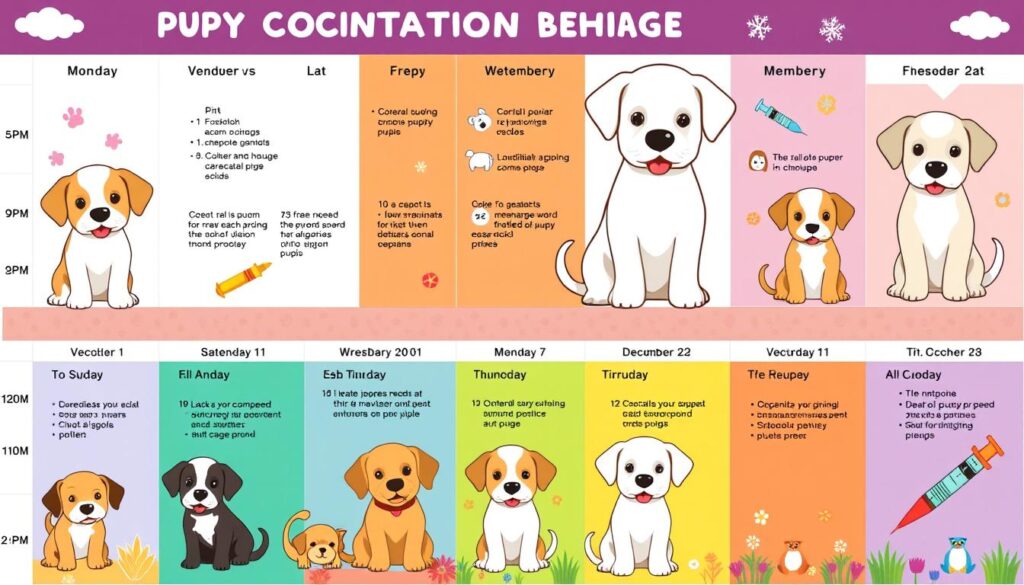
Socialising Your Puppy Safely
Socialising your puppy early is key for their behaviour and confidence. Puppy socialisation happens between 3 and 12 weeks. It helps prevent future behaviour problems.
The American Veterinary Society of Animal Behavior says it’s vital. Behavioural issues are the top cause of death in young dogs.
Avoiding Exposure to Unvaccinated Dogs
Socialisation is important, but your puppy must be safe first. Avoid dog parks or other dogs until they’re fully vaccinated. Wait until they’ve had all their shots before taking them out.
Introducing Your Puppy to New Environments
Introduce your puppy to new things slowly. This includes car rides and pet-friendly stores. It helps them get used to different sights and sounds.
Local pet stores like Centinela Feed & Pet Supplies in Huntington Beach are great for socialising. Dog-friendly places like bakeries and cafes are also good for meeting new people and places.
Services like puppy schools and board-and-train programs are great for supervised socialisation. They help your puppy get the early exposure they need to grow well.

“Proper socialisation during the early stages of a puppy’s life is essential for raising a confident and well-adjusted adult dog.”
Essential Puppy Vaccination Tips
Keeping your puppy’s vaccinations up-to-date is key for their health and growth. It’s wise to have at least one yearly vet visit for a check-up and vaccinations. The need for certain vaccines depends on your puppy’s age, health, lifestyle, and habits. Some pets need yearly vaccines, while others might only need them every three years.
Here are some essential puppy vaccination tips and key puppy vaccination advice to help your furry friend stay healthy:
- Puppies need 3 vaccinations: the first at 6-8 weeks, the second at 12-14 weeks, and the third at 16-18 weeks.
- Adult dogs need yearly booster shots to keep them safe from diseases.
- Pets age faster than humans. By 2 years old, most pets are considered seniors at 8 years old.
| Vaccination Schedule | Vaccines Administered |
|---|---|
| 6-8 weeks | Parvovirus, Distemper, Hepatitis |
| 12-14 weeks | Parvovirus, Distemper, Hepatitis, Para-influenza virus, Bordetella bacteria, Coronavirus, Leptospirosis |
| 16-18 weeks | Parvovirus, Distemper, Hepatitis, Para-influenza virus, Bordetella bacteria, Coronavirus, Leptospirosis |
Canine Parvovirus, Distemper, and Hepatitis can be deadly. Regular vaccinations are vital to protect your puppy’s health.
“Keeping your puppy’s vaccinations up-to-date is crucial for a healthy lifestyle and proper pet development.”
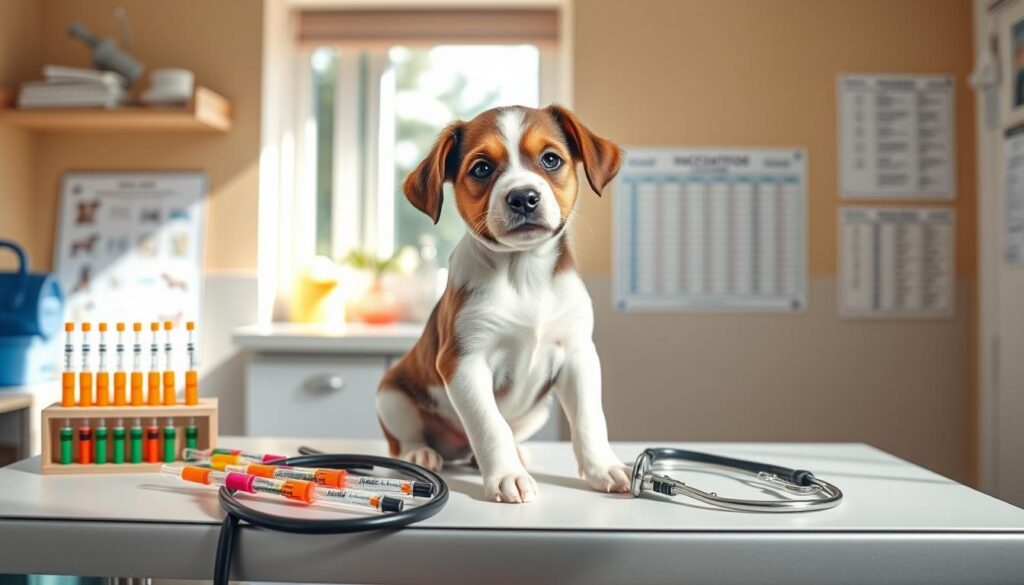
Remember, budgeting for puppy vaccinations and vet care is possible. Local vets and care plans can help. Charities like PDSA and Blue Cross offer financial help for pet owners. Stay informed and work with your vet to keep your puppy healthy and happy.
Potential Side Effects and Precautions
Vaccinating your puppy is key for their health. It’s vital to know about possible side effects. Most reactions are mild and short-lived. But, watch your puppy closely and get vet help if symptoms worry you.
Common Mild Reactions
After getting vaccinated, puppies might feel a bit off. They might be tired, have a small bump at the shot site, or feel a bit feverish. They could also sneeze or cough a bit.
These signs usually don’t last long, just a day or two. They’re a normal part of how the body reacts to the vaccine. If your puppy’s symptoms are mild, there’s usually no cause for alarm.
Rare but Serious Side Effects
Though rare, some puppies can have serious side effects from vaccines. These include allergic reactions, where they might break out in hives or have trouble breathing. They could also develop immune diseases or tumors at the shot site.
If your puppy shows any of these serious signs, get them to the vet right away. Quick action can help manage symptoms and prevent serious problems.
To lower the risk of side effects, follow your vet’s advice closely. Don’t overdo it with your puppy after they’ve been vaccinated. And tell your vet about any bad reactions right away. Taking these steps can help keep your puppy safe and healthy during their vaccination process.
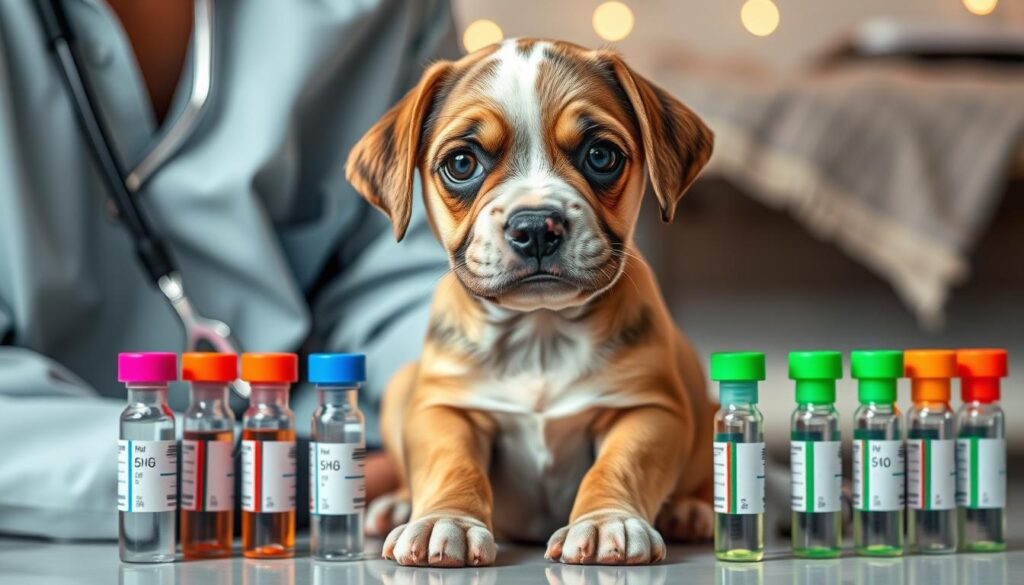
Maintaining Adult Dog Vaccinations
It’s vital to keep your dog’s vaccinations current, even when they’re grown. Core vaccinations, like those against distemper and parvovirus, are given every three years. But, if your dog’s life is less risky, they might not need them as often.
Non-core vaccines, such as those for kennel cough and leptospirosis, might need to be given more frequently. This depends on your dog’s life and health. Regular vet visits are key to making sure your dog’s vaccinations are right for them.
Keeping your dog’s vaccinations up-to-date is crucial for their health and the health of other pets. By doing so, you help prevent diseases and protect other animals in your area.

